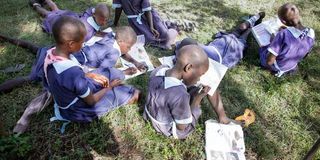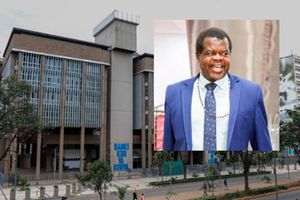
The National Assembly during a past session. The National Assembly has unlocked the disbursement of the Sh50.5 billion in donor support to county governments after passing the long overdue County Governments Additional Allocation (CGAA) Bill 2025.
In a case of robbing Peter to pay Paul, MPs raided the capitation funds for learners in public schools to finance examination administration and invigilation.
As lawmakers considered estimates for the 2025/26 financial year, the Ministry of Defence was a big winner.
Examination administration and invigilation in public schools requires Sh11 billion, but this had not been allocated in the National Treasury's estimates, prompting MPs to reallocate some funds from capitation to raise Sh5.9 billion to quell public anger.
In a report on the estimates, the Budget and Appropriations Committee (BAC) of the National Assembly reduced the capitation funds for secondary schools by Sh5.9 billion, junior secondary schools by Sh3 billion, and primary schools by Sh2 billion and Sh900 million respectively.

Pupils of Mboto Sunrise Primary School do their Competency-Based Curriculum assignment under a tree on September 29, 2022.
While the MPs' move is part of fiscal consolidation measures aimed at balancing the Sh4.2 trillion budget for the next financial year, the reduction in capitation funds will particularly affect learners from poor families, as many of them depend on government capitation funds for their education.
In an attempt to prevent a strike by the 8,570 Universal Health Coverage (UHC) workers, 2.1 billion shillings have been proposed to confirm their employment on a permanent and pensionable basis.
The BAC report, chaired by Samuel Atandi MP, notes that addressing employment gaps, such as those in the UHC, is crucial for strengthening public service delivery, enhancing professional development, and supporting economic productivity.
“Job creation and youth empowerment remain pressing concerns for the general public, particularly the absorption of the UHC staff and intern teachers on permanent and pensionable terms and medical doctor internship,” says Mr Atandi.
The BAC report, whose adoption by the House will greatly inform National Treasury Cabinet Secretary John Mbadi’s budget highlights and revenue-raising measures in the National Assembly on June 12, 2025, is currently under debate in the House.
The UHC staff have already been allocated Sh5 billion to pay their gratuity upon expiry of their contracts in May 2026.
The absence of dedicated financial support led to uncertainty within the education sector, highlighting the urgent need for budgetary intervention.
“Given that examinations are considered a national security matter, adequate funding is essential to ensure their integrity and smooth administration,” said Tinderet MP Julius Melly, who chairs the House Committee on Education and Research, when he appeared before BAC.
Notably, in the current financial year, examination-related funding was provided as an emergency through a supplementary budget, underscoring the critical nature “of this issue and the necessity of a structured approach in future financial planning”.
ICT in secondary schools
Other than capitation funds, the MPs have also recommended that the Sh250 million meant for the development of ICT integration in secondary schools be slashed, as they sought an increase of Sh100 million for teachers' training colleges infrastructure.
Also affected is university education where MPs are proposing a reduction of Sh1.5 billion, which includes Sh1.3 billion from the government-sponsored students in private universities kitty, Sh250 million from University of Eldoret’s construction of an engineering complex and Sh250 million from the Open University.
The National Police Service (NPS) and the National Intelligence Service (NIS) were also affected as they were not allocated funds for the recruitment of personnel. Their hope now lies with the supplementary budget for the next financial year, but only if the economy improves.
For instance, the NPS was not allocated Sh3.5 billion to recruit 10,000 police constables, Sh9.8 billion for procurement of the police insurance, Sh8.1 billion for security operations and Sh767 million to clear pending bills.

Youths go through physical fitness tests during the Kenya Police Service recruitment drive at Mweiga Stadium in Nyeri County on July 14, 2014. PHOTO | JOSEPH KANYI | NATION MEDIA GROUP
NIS had pushed for Sh2 billion allocation for the recruitment of staff. But even as the various government agencies face a severe financial crisis in the next financial year that begins on July 1, 2025, the Ministry of Defense saw its Sh200 billion allocation as per the estimates, enhanced by Sh13 billion.
The proposed Defense additional allocation will see Sh2 billion used for the enlisting of military recruits, Sh5 billion for operations in Somalia, Sh6 billion for security operations, which was recommended by the National Treasury.
Under the Free Primary Education (FPE), the government allocates Sh1,420 per primary school learner annually and Sh15,042 per junior school student.
For secondary education, the annual capitation is Sh22,244 per learner, although this was recently reduced to approximately Sh15,000 per year.
The capitation to schools is usually done in three phases of 50 percent allocation in term one, 30 percent in term two and 20 percent in term three.
In March, schools received the remaining Sh14 billion in capitation funds for the first term.
There have, however, been concerns raised by school principals regarding the amount allocated, with some citing it as inadequate and leading to financial difficulties.
Some schools have reported discrepancies between the number of students on the roll and the number of students for whom capitation is disbursed, resulting in insufficient funding.
BAC has also recommended an increase of Sh100 million for infrastructure development for Rongo University, Sh125 million increase for infrastructure development for Jaramogi Oginga Odinga University.
The other affected areas include Sh10 billion required for fertilizer subsidy programme to encourage food production, Sh5.53 billion for the much-needed reforms in the sugar companies following the enactment of the Sugar Act 2024, Sh4.5 billion for tea reforms, Sh2 billion for strategic food reserve (SFR) and Sh1.7 billion for seed subsidy programme.
The MSME’s Agricultural credit (AFC) that is critical in enhancing access to affordable credit by farmers has not been allocated Sh1.5 billion.
Nonetheless, the MPs have proposed an increase of Sh50 million for the construction of Education Assessment Resources Centres (EARCs) and Sh100 million for Special Needs Education (SNE) capitation enhancement.
There is also a proposed increase of Sh100 million for infrastructure support to Secondary Special Needs Schools and an increase of Sh400 million for infrastructure improvement in secondary schools.
The other areas that received an increase include Sh200 million for Kenya Institute of Curriculum Development (KICD) and Sh219 million for public participation projects.








